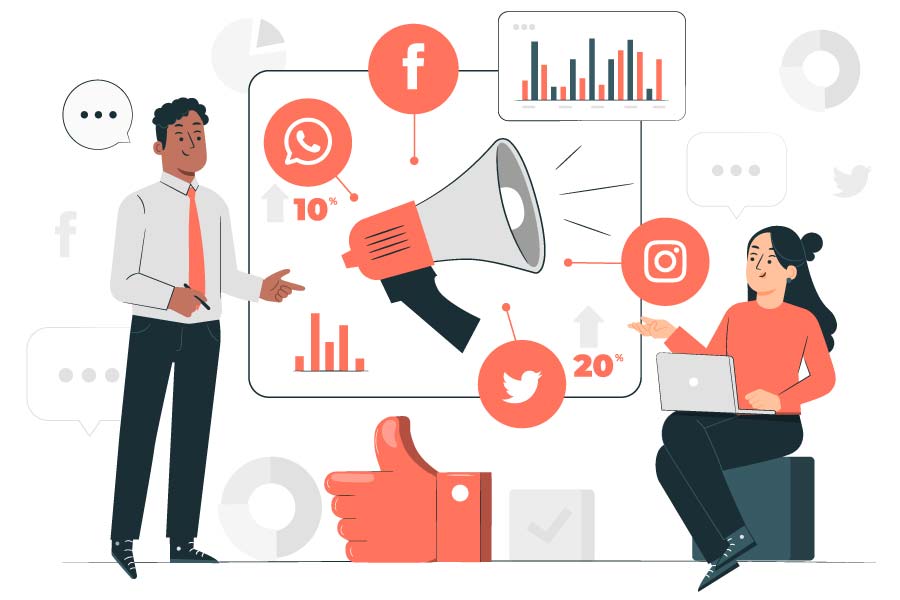7 Healthcare B2B Marketing Trends in 2022

Healthcare marketing is an industry that has experienced a lot of change in recent years. With new technologies and trends emerging, healthcare marketers must be prepared to adapt and evolve their strategies to remain competitive. The healthcare B2B market is expected to grow from $1 trillion in 2019 to $1.41 trillion by 2022. This growth will be driven by an ageing population and growing patient expectations regarding the quality of healthcare services.
Healthcare businesses must adapt to new healthcare trends in B2B marketing. You can’t help but wonder what the future holds for healthcare B2B marketing. If you’re wondering what the next year will bring, here are seven trends that could greatly impact healthcare B2B marketing in 2022.
1. Healthcare Marketing Automation will Go Mainstream
Marketing automation is already one of the most effective ways to reach sales prospects and customers, but many marketers are still hesitant to embrace it fully. As more businesses realize how powerful marketing automation can be, expect to see more companies adopt this valuable tool in the coming years.
2. Video Content will Become Increasingly Important
Healthcare marketers are already using video content extensively to tell their stories and engage with prospects and customers. However, as more people spend increasing amounts of time watching videos online, expect this trend to continue growing into 2022 — especially on social media platforms like Facebook and Instagram, where video ads perform better than traditional ad formats.
3. Sponsored Posts will Rise in Popularity
Sponsored posts are one of the fastest-growing forms of paid media on Facebook right now because they allow brands to target highly specific audiences while appearing organic and natural (as opposed to straight-up ads).
4. Improved Engagement From AI and Chatbots
AI-powered chatbots and virtual assistants are quickly becoming essential to how businesses interact with their customers. Businesses can now use them to answer customer questions, offer personalized recommendations and even make sales. As AI technology becomes more advanced, these chatbots will become even more useful for helping businesses improve customer engagement. Artificial intelligence has been around for a while now, but it’s only recently that marketers have started using it as part of their marketing strategies. AI allows marketers to automate tasks like lead scoring and email nurturing to focus on higher value tasks like identifying new leads from social media or creating content that resonates with their audience better than ever before.
5. More Personalized Content for Targeted Audiences
Marketers have always been able to target specific audiences with their content, but now they have even more ways to do so through personalization technologies like dynamic ads and retargeting. These tools allow marketers to send highly relevant messages and offers to their target audience based on what they’ve already seen online or offline (like if someone has visited your website before). This makes it easier for businesses to engage with their target audience on social media platforms like Facebook or Instagram.
6. Customer Experience Management
A customer-centric approach is a key to success in business today. Customers are no longer just passive recipients of products and services; they now play an active role in deciding which brands and products they want to buy. They also expect companies to understand their needs and deliver what they want, when they want it, and where they want it.
The best way for healthcare marketers to provide a great customer experience is by understanding their customers’ needs, wants, and desires. This can be achieved through various surveys and social media listening. The results of these methods can then be used to create marketing strategies and campaigns that address the issues customers face at every stage of their journey with your brand or product.
7. The Rise of Digital Marketing
Digital marketing has been around for years and continues to grow. In fact, according to The Economist Intelligence Unit, digital advertising will account for around 55% of total ad spending by 2022. This is great news for businesses that want to reach their target audience without spending millions on traditional advertising methods such as print or TV ads.
Online advertising has grown rapidly over recent years due to its ability to easily target specific demographics and geographic locations while offering lower costs than traditional forms of advertising like print or TV ads. As more people shop online, companies are allocating a larger portion of their budgets towards digital advertising methods such as search engine optimization (SEO), paid search ads (Google AdWords), social media marketing and email marketing campaigns.
Conclusion
According to the Harris Poll Reputation Quotient Index, healthcare companies have some of the highest reputations in the world, with an average score of 85 out of 100. This means that people are generally satisfied with the products and services they receive from healthcare companies. However, this may also mean that there isn’t much room for improvement regarding marketing strategies.
While customer experience has always been important in healthcare, it will become more important in 2022 as more people seek treatment online or via mobile devices. In fact, according to a study by Harris Interactive Inc., 19% of patients say they’d be willing to change health plans if their preferred doctors weren’t available under their current plan.
